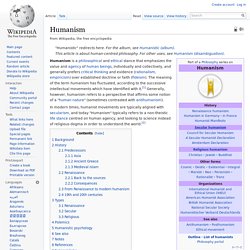

Humanism. In modern times, humanist movements are typically aligned with secularism, and today "Humanism" typically refers to a non-theistic life stance centred on human agency, and looking to science instead of religious dogma in order to understand the world.[2] Background The word "Humanism" is ultimately derived from the Latin concept humanitas, and, like most other words ending in -ism, entered English in the nineteenth century.

However, historians agree that the concept predates the label invented to describe it, encompassing the various meanings ascribed to humanitas, which included both benevolence toward one's fellow humans and the values imparted by bonae litterae or humane learning (literally "good letters"). In the second century A.D, a Latin grammarian, Aulus Gellius (c. 125– c. 180), complained: Gellius says that in his day humanitas is commonly used as a synonym for philanthropy – or kindness and benevolence toward one's fellow human being. History Predecessors Asia Ancient Greece Types. Humanismus. Humanismus ist eine seit dem 19.

Jahrhundert gebräuchliche Bezeichnung für verschiedene, teils gegensätzliche geistige Strömungen in diversen historischen Ausformungen, unter denen der Renaissance-Humanismus begriffsbildend herausragt. Gemeinsam ist ihnen eine optimistische Einschätzung der Fähigkeit der Menschheit, zu einer besseren Existenzform zu finden. Es wird ein Gesellschafts- und insbesondere Bildungsideal entworfen, dessen Verwirklichung jedem die bestmögliche Persönlichkeitsentfaltung ermöglichen soll.
Damit verbindet sich Kritik an bestehenden Verhältnissen, die aus humanistischer Sicht diesem Ziel entgegenstehen. Hinsichtlich der konkreten Inhalte bestehen zwischen den einzelnen Humanismuskonzepten große Unterschiede, die sich aus der Verschiedenheit der anthropologischen Grundannahmen ergeben. Der Humanismus der Renaissance war eine breite Bildungsbewegung, die auf antike oder als antik angesehene Vorstellungen zurückgriff.
Breites Spektrum neuerer Lesarten[Bearbeiten] Friedrich Immanuel Niethammer. Leben[Bearbeiten] Der in Württemberg in einer Pfarrersfamilie geborene Niethammer trat 1780 in die Klosterschule in Denkendorf ein, wechselte 1782 in die höhere Klosterschule nach Maulbronn und wurde 1784 Stipendiat im Tübinger Stift, wo er Friedrich Hölderlin, Georg Wilhelm Friedrich Hegel und Friedrich Wilhelm Joseph Schelling kennenlernte. 1790 kam er nach Jena, wo er bei Carl Leonhard Reinhold die Philosophie Kants studierte und sich mit Franz Paul von Herbert aus Klagenfurt anfreundete, mit dem er bis zu dessen Tod befreundet blieb und in dessen Bleiweißfabrik er 1793/94 arbeitete.

Beide waren auch mit dem Reinhold-Schüler Johann Benjamin Erhard befreundet, der 1795 das Buch Über das Recht des Volkes zu einer Revolution veröffentlichte. 1795 widmete er Herbert die Schrift Über Religion als Wissenschaft zur Bestimmung des Inhalts der Religionen und der Behandlungsart ihrer Urkunden. Bis 1804 wirkte er als außerordentlicher Professor der Theologie in Jena. Literatur[Bearbeiten] Civic Humanism. First published Tue Oct 1, 2002; substantive revision Tue Dec 13, 2011 A variant of republicanism indicating active, participatory, patriotic citizenship as well as the ethos and educational ideal that goes with it.

The term was coined in the context of the embattled Weimar Republic and its genesis is deeply marked by the traditions of German historical scholarship. It was first used by the historian Hans Baron to describe an upsurge of patriotic republicanism as a response to foreign aggression and despotism, informed by the revival of classical models in Renaissance Florence.
This movement is also taken as a decisive turning point away from medieval ways and towards liberating modernity. YouTube - RSA Animate - Drive: The surprising truth about what motivates us RSA Animate - Drive: The surprising truth about what motivates us. The boffins and the luvvies. Eric Schmidt, the executive chairman of Google, generated headlines in the United Kingdom recently for what one major paper there called his "devastating critique" of the English education system.

His remarks came in the course of delivering the prestigious MacTaggart lecture at the Edinburgh International Television Festival. While he aimed for the most part at reassuring the high-level executives in his audience that they have nothing to fear from the coming merger of the Internet with TV, Schmidt also made a point of chastising British schools for inadequately promoting technological literacy. English scientists have invented three of the most powerful technologies the world has ever seen, Schmidt said — photography, television, and computers — yet England has failed to maintain global leadership in any of those fields. A principle reason for that failure, he said, has been "a drift to the humanities" in the curricula of British schools.
Related: 02mytwi01: The Ancients &/t Moderns. The boffins and the luvvies. Eric Schmidt, the executive chairman of Google, generated headlines in the United Kingdom recently for what one major paper there called his “devastating critique” of the English education system.

His remarks came in the course of delivering the prestigious MacTaggart lecture at the Edinburgh International Television Festival. While he aimed for the most part at reassuring the high-level executives in his audience that they have nothing to fear from the coming merger of the Internet with TV, Schmidt also made a point of chastising British schools for inadequately promoting technological literacy. English scientists have invented three of the most powerful technologies the world has ever seen, Schmidt said — photography, television, and computers — yet England has failed to maintain global leadership in any of those fields.
A principal reason for that failure, he said, has been “a drift to the humanities” in the curricula of British schools. Related: